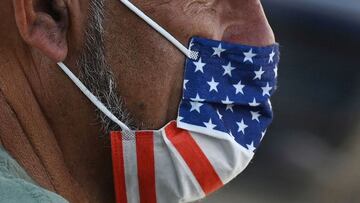Coronavirus US: why does the Delta variant spread so fast?
The new variant is driving up covid-19 cases worldwide and is causing alarm for governments and economists.


In the last week covid-19 infections have risen by 47% in the US. The Delta variant leads the attack as the new variant of concern that is quickly swamping communities. Cases are rising but this can't be fully attributed to the variant as lack of vaccinations allow the virus to spread more easily.
What role has the Delta variant played in rising infections?
First sequenced in India, the B.1.617.2. variant quickly overwhelmed the south Asian country and began to spread around the world. In the US it currently accounts for more than 83% of all covid-19 cases and is due to eliminate the spread of other vairants within a week.
What makes the variant so contagious?
One of the main reasons is its high viral load. This means the speed the variant reproduces in the body is fast and people can become infected with a shorter contact time. It is estimated that the viral load of Delta is 1260 times more than variants from the beginning of the pandemic. Health guidance says there is a risk of infection even with people outdoors for no more than five minutes.
Getting vaccinated is the most important thing you can do to protect yourself and the people around you from the Delta variant of COVID-19. Find a free vaccine near you at https://t.co/4MYpWqXVVo.
— President Biden (@POTUS) July 25, 2021
Dr. Ashish K. Jha, Dean, Brown University School of Public Healthsaid, "this is the most contagious variant of the virus we have seen in the whole pandemic." Indeed, the CDC notes that Delta is 55% more contagious than Alpha variant first sequenced in the UK. The Alpha variant was itself 50% more contagious than he original strain from Wuhan in China. Public Health England anticipates that the R-value, that is how many people will be infected by one person, could be "greater than five and maybe up to seven," if there variant was left to run riot with no restrictions.
The variant is the most infectious to date, but that doesn't mean wholesale restrtictions are returning to contain it, quite the opposite.
More Delta variant news:
- How has the covid-19 Delta Variant affected Stock Markets?
- How has the covid-19 Delta variant affected travel restrictions?
- Can vaccinated people spread the Delta variant?
- Are the majority of covid-19 hospitalizations in the US from non-vaccinated people?
- Should I wear my mask in public spaces if I am vaccinated?
Are their any other factors involved?
The greatest factor in preventing the spread of the Delta variant are vaccination rates. The states with the highest rates of covid-19 right now are those with low vaccination rates with more than 40% of national cases occuring in just four states. As of the last reported numbers from Friday July 23, Florida accounted for nearly a quarter of the national total with 14,258 new cases out of 64,317 nationwide. The state doesn't yet have half of its population fully vaccinated and a large outbreak as is happening could be disastrous.
As the vaccine rollout continues, many states across the US have been relaxing restrictions in the last few months. More social interactions, especially with people indoors, contribute to a rise in cases. Last month California ended its mask mandate, only for it to be reimposed in some counties mere weeks later. The relaxing of restrictions have only exacerbated the covid-19 rate with the increased infectiousness of the Delta variant. For states with high vaccination rates this isn't so much of a problem but with the US soon heading toward winter an increased vaccine drive is paramount before another winter spike in infections.
“The Delta variant may be getting the blame, but fueling its rise is an older foe: vaccine hesitancy and refusal…Were a wider swath of the population vaccinated, there would be no resurgence—of the Delta variant, or any other version of the coronavirus.” https://t.co/ILAOcJTtJu
— Bill Kristol (@BillKristol) July 26, 2021
Related stories
Chief Medical Advisor Dr. Anthony Fauci says people should still wear masks if they want to be extra safe. “It’s suggested that you wear a mask when you are indoors in a situation where you have a level of dynamics of virus in the community that’s high,” he said. The three US vaccines offer good protection against the Delta variant but those unvaccinated are very much at risk.
And with less than half of the US population being fully vaccinated, according to CDC data, the CDC is warning of a "pandemic of the unvaccinated." Double vaccinated people can still catch the virus, but the risk of serious illness is extremely low. 97% of hospitalizations with covid-19 are people who are unvaccinated.

